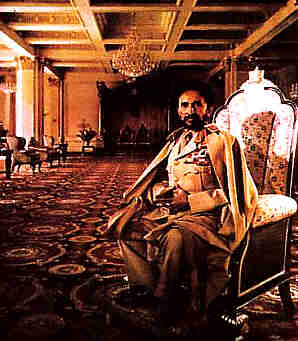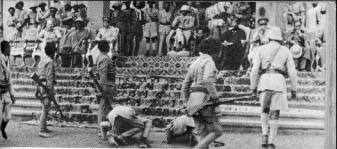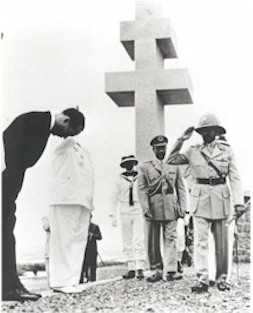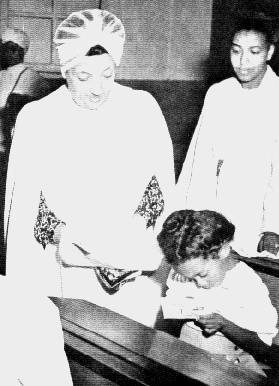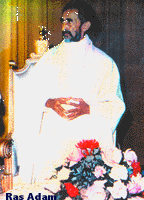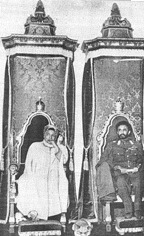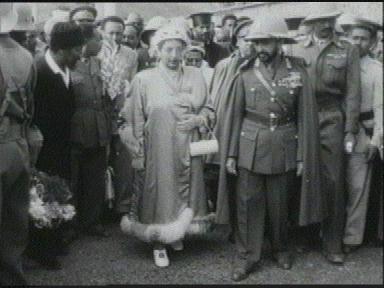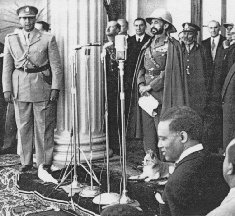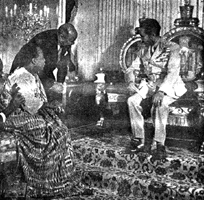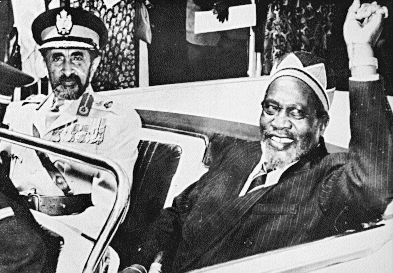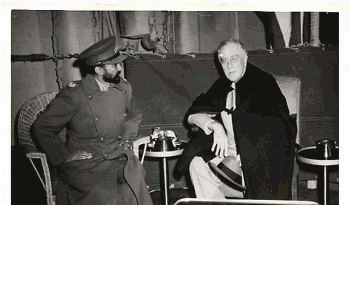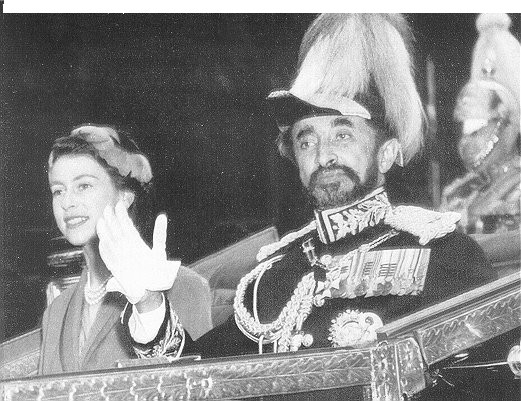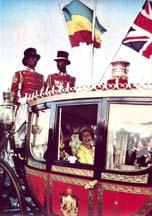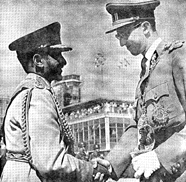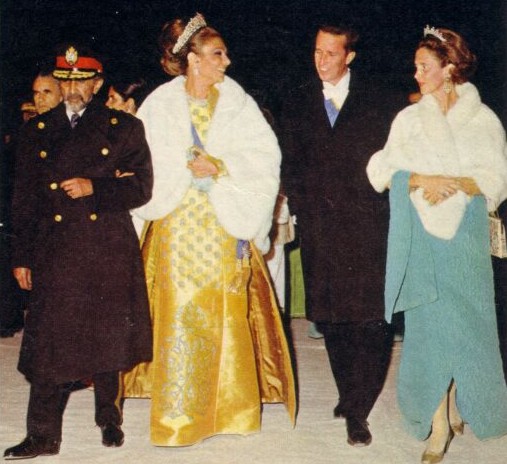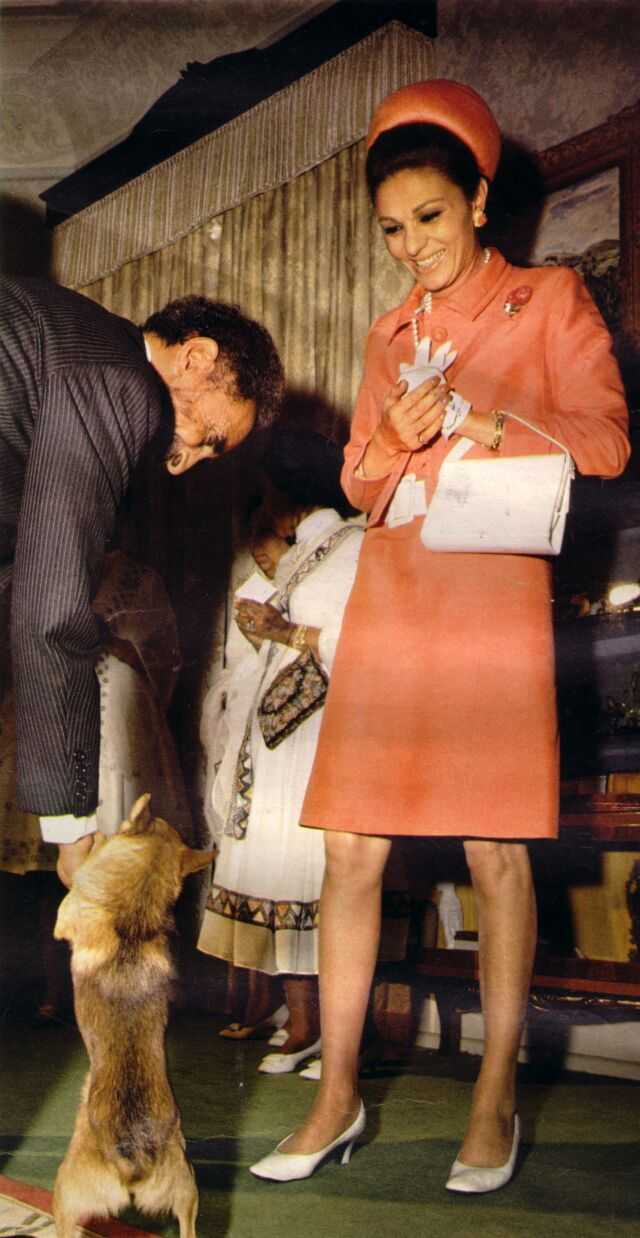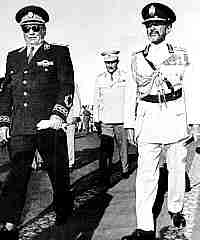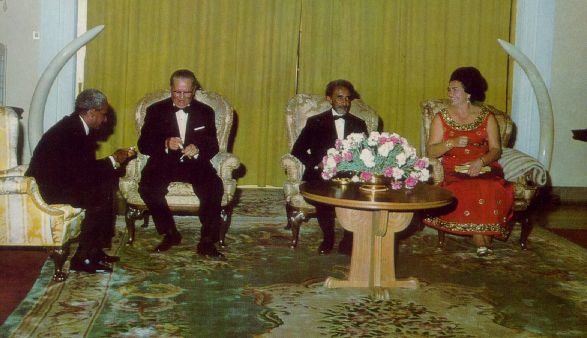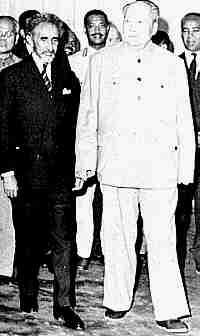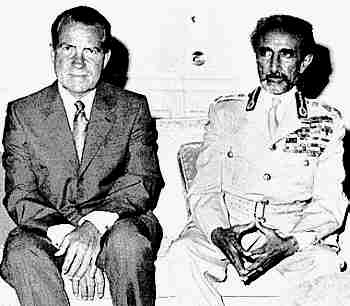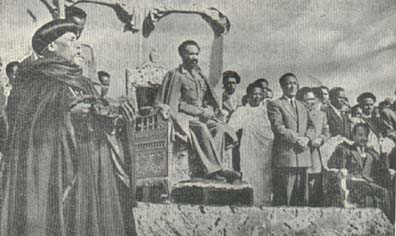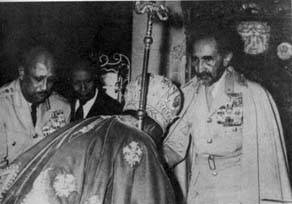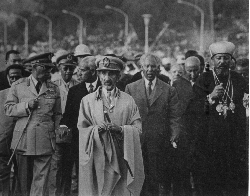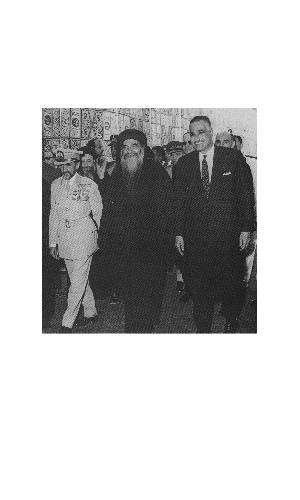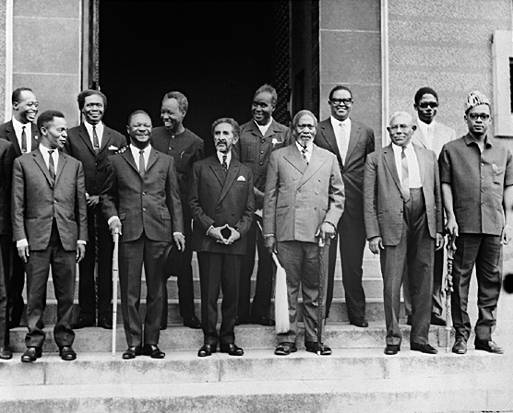Lij Michael Imiru, Last Imperial Prime Minister (July 1974 - September
1974)
 His Imperial Majesty in 1974, a few months before he was deposed, and
about a year before he was killed.
His Imperial Majesty in 1974, a few months before he was deposed, and
about a year before he was killed.
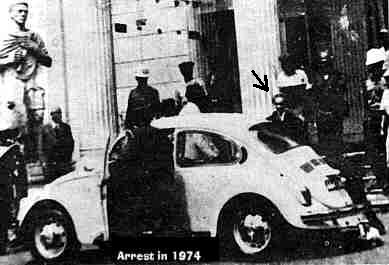 His Imperial Majesty being removed from the Jubilee Palace in Addis
Ababa following his deposing by the Derg. He was taken away in this baby blue
volkswaggen bug. An arrow indicates the Emperor as he walks towards the car.
September 11th, 1974.
His Imperial Majesty being removed from the Jubilee Palace in Addis
Ababa following his deposing by the Derg. He was taken away in this baby blue
volkswaggen bug. An arrow indicates the Emperor as he walks towards the car.
September 11th, 1974.
The Fall
After months of the military co-ordinating committee (Dergue) placing members of
the Aklilu Haptewold and Endalkatchew Makonnen governments in prison, along with
the senior military officers, nobility and regional governors and officials, it
became clear that the days of the Emperor on the throne were numbered. The press
was full of vitriol and scathing attacks on the fallen governments, on the
corruption and incompitence of the officials, and even on the character and the
performance of the Emperor himself. The attacks on the Emperor ranged from
critics that stated his reign had been too long, that he should have abdicated
in favor of his son or one of his grandsons long ago, that he was too old and
too senile to hold state responsibility, to outright attacks on his character
labeling him a thief and a despot. The daily attacks eroded the Emperor's once
vast popularity and laid the groundwork for the inevitable. On September 11th,
1974, Ethiopians celebrated their New Year, welcoming the year 1967 according to
their version of the Julian Calandar. During the day, truckloads of soldeirs
spread out from the baracks of the 4th division and took up strategic positions
all over the capital. Tanks and armoured personnel carriers rolled down the
streets of Addis Ababa and jeeps with mounted machine guns took up guard outside
banks, ninistries, palaces and important junctions in the city. Soldiers wore
stickers with the slogan "Ethiopia Tikdem" (Ethiopia before all) on their
helmets. Rumors swept the city that Princess Tenagnework and several other
members of the Emperor's immediate family had been placed under arrest. Nothing
in the press indicated what exactly was going on. In fact, the Emperor's
daughter Princess Tenagnework, his daughter-in-law Princess Sara Duchess of
Harrar and all their children were placed under arrest in Addis Ababa. In
Tigrai, the hereditary Prince Ras Mengesha Seyoum had already taken to the hills
with a band of followers, but at Mekele's castle, his wife Princess Aida Desta
(daughter of Princess Tenagnework) along with her daughter and the children of
her sister Princess Seble were arrested and put on a plane back to Addis Ababa.
The Imperial family was systematically being rounded up. Rumors swept the city,
but nothing official was announced. Late in the day, as was traditional, the
Patriarch of the Ethiopian Orthodox Church, Abune Theophilos gave his yearly New
Year's Address on national television and radio. In his speech, the Patriarch
likened Ethiopia to a ship in stormy seas, charting a new path into the future.
At the end of the speech, for the first time ever, he failed to bless the
Emperor and the Imperial family, and instead wished success to the mission of
the co-ordinating committee. For the Emperor's loyalists it was a jarring and
shocking development. In 1960, Abune Basilios had condemned any attempt to
dethrone the man annointed by the Church and stood firm against the Imperial
Guard coup attempt. That his successor should make a statement that seemed to
abandon the Emperor to his fate was a shock. Then came the Coup-de-Grace on the
reign of Haile Selassie I. Ethiopian Television, showed the Ethiopian public the
BBC production of the Hidden Famine by Jonathan Dimbleby. The film showing the
horrifying famine in Wollo with scenes of death and starvation was damaging
enough on it's own, but the Dergue had re-edited the film to include footage of
lavish palace banquets and ceremonies in honor of the Emperor's 80th birthday,
the marriage of Prince Asrate Kassa's daughter, and other glittering court
events. The Emperor was also shown feeding his pet leopards and dogs choice cuts
of meat from silver platters held by liveried servants. People watching the film
in public places were seen to weep. This time no mention was made of the Aklilu
cabinet hiding the famine from the Emperor, or of the ogtagenerian Emperor being
out of touch. The film was made to make him seem heartless and steeped in luxury
while his people suffered untold misery. It was the final nail in the coffin of
Haile Selassie's reign, and indeed in the coffin of the worlds oldest monarchy.
The following morning, September 12th, 1974 (Meskerem 2, 1967 Ethiopian
calander) ten junior officers who were members of the Dergue arrived at the
Jubilee Palace which was surrounded for the first time by tanks and machinegun
mounted jeeps. A small mostly male crowd had gathered outside the gates
suspiciously at the same time as the ten officers. The officers were led by
Major Debela Dinsa. Their mission was to inform the King of Kings that his reign
was over and to remove him from his palace. Concerned that he might not be
cooperative, the Dergue had asked Ras Imiru Haile Selassie, the Emperor's
cousin, life long companion, and socialist sympathizer, to come with them to
convince him to step down peacefully. Ras Imiru was also the father of Lij
Michael Imiru, the recently appointed Prime Minister. The officers were all
armed with Uzzi sub-machineguns and revolvers, and some had grenades strapped to
their belts. The senior prince and junior officers waited at the gates for a
camera crew from Ethiopian Television to show up. Much to their irritation, the
camera crew did not materialize, and when calls were made, it became apparent
that Ethiopian Television had not been informed of the event so they scrambled
to get a camera man to the palace at once. The small group then entered the
palace and asked to see the Emperor. The palace no longer had throngs of
courtiers and noblemen attending the Emperor's person, only the servants walked
the halls. Debela Dinsa's account (refered to in Guenet Ayele's book "Ye Colonel
Mengistu Tizitawoch" as "Dergue member 11" at a transparent attempt at
annonimity) states that the encounter between the Emperor and the group of
officers took place in the Grand Throne Room, but the film of the event
indicates it took place either in the Palace library or the Emperor's study. The
film is quite compelling. The armed soldiers stood in a line facing the Emperor,
with Debela Dinsa standing at the center of the line. He stepped forward and
saluted before producing from his pocket a speech which he read out loud to the
Emperor. The letter was a decree of the Dergue removing Haile Selassie I from
the Imperial throne and charging him with abuse of power, lack of compitence to
continue to reign due to his advanced age, and the additional charge of
embezzeling the money of the people. The Emperor listened to the speech in
silence. Debela Dinsa's hands were visibly shaking throughout his reading of the
speech, and his fellow soldiers, although armed to the teeth, seemed awed and
nervous while the Emperor sat, regal in his bearing and completely silent. Once
the speech was finished, the Emperor continued to sit completely silent looking
at the soldiers. Debela Dinsa freely admits in his account of the event that he
was awed and frightened in the Emperor's presence, and he completely understood
the stories that even though the Emperor was such a small frail old man, there
was something about him that compelled you to bow low before him. As the nervous
tension increased in the room, Ras Imiru approached the Emperor and they spoke
in low tones for an extended time. The Emperor then spoke. His statement was
simple and moving. He stated that all through his life, he had tired endlessly
for the benefit of his country and his people, and that ones individual desires
could not come ahead of the needs of the nation. The Emperor's role was to lead
in good times and bad, he said, and to serve his people always and without fail.
If it was determined that this was for the greater good of Ethiopia, then he
would accept the decision and do what was required of him. After another nervous
extended silence, still refering to the Emperor as "Your Majesty", Debela Dinsa
asked that the Emperor accompany him and his fellow officers to a place where he
"would be safe and comfortable". The Emperor asked "Where are you taking me".
Debela Dinsa replied that a place had been prepared for "your majesty" that
would offer comfort and protection of his safety. The Emperor asked if he could
bring some retainers. Debela Dinsa said that he would be allowed some retainers,
but for the time being, the Emperor was to bring just one servant with him. The
Emperor called out to his servant Merid who came quickly. The Emperor rose and
started to walk out with the officers. Ras Imiru, visibly moved asked if he
could come with the Emperor. The soldiers informed "His Higness" that he could
not come with them, but that he could come see the Emperor later in the day. As
the Emperor walked past Debela Dinsa, he asked him "Why are you holding your gun
like that?" refering to the Uzzi in Debela Dinsa's hands. Debela Dinsa nervously
replied that it was so he could carry the gun more comfortably. The Emperor
smirked and said "I think not, I think it's so you can shoot it more easily."
and swept by him. As the Emperor walked through the palace with his armed
escort, liveried servants began to gather and follow. They all looked shocked
and bewildered. When they arrived at the front portico, footmen, maids, Imperial
guards, gardeners, and other staff both male and female had gathered on the
steps and at the windows of the palace. Debela Dinsa said most of the men looked
stunned and many were staring at their shoes or the ground. It was obvious to
them all what was happening. Most were openly weeping. A small caravan of
vehicles pulled up. The Emperor caught sight of the car which was to take him
away from the Jubilee Palace for the last time. It was a small baby blue
volkswagen beetle, a far cry from the Rolls Royce and Benz limosines that he was
accustomed to. Members of the Dergue have since claimed that this car was chosen
in order to take the Emperor away with maximum annonimity to protect him fromt
he anger of the people, and not to humiliate him in anyway. This is belied by
the fact that the small car was escorted in front and back by two jeeps with
mounted machine guns, making it just about the most conspicuous car in the city.
For years afterwards, the Dergue would often display this car in public as the
final humiliating end of Haile Selassie's reign, so this statement is obvious in
it's absurdity. As the Emperor was driven away, his servants began to wail and
weep loudly, many beating their chests as if at a traditional funeral. Of all
his former subjects, the staff of his palaces, people with little power and
relatively small personal gain from his reign, have remained the most
consistantly loyal to the Emperor's memory. Once outside the gates however the
scene changed dramatically. The small crowd of men which had gathered opposite
the palace gates began to scream "Thief! Thief! Thief!" at the Emperor as he
passed. They followed the little group of cars as they drove slowly through the
city, running after them screaming abuse at the man who had reigned over them
till that very morning. Members of the Dergue have claimed that this was a
spontaneous demonstration by people who were enraged at the Emperor following
the previous night's broadcast of "The Hidden Famine". The Dergue leader and
subsequent dictator Mengistu Haile Mariam in an interview with a biographer
Genet Ayele told her that he found the denunciations of the Emperor distasteful
and hated the fickleness of these people who only weeks earlier would have bowed
to the ground before him. This statement ofcourse should be taken with a grain
of salt, as Mengistu spent his entire rule of Ethiopia trying to demolish the
memory of Haile Selassie and his reign. However, others have stated that the
group of young men, who suspiciously gathered at the gates just as the group of
officers arrived to enter the palace that morning, was actually a group of
soldiers ordered by the Dergue to appear in civilian dress in order to give the
dethronement a look of civilian approval and perhaps also to humiliate Haile
Selassie I. If this was the case, it was an unnecissary and cruel measure, for
within minuites of Radio Ethiopia announcing that Haile Selassie I had been
removed from the Imperial throne, students from the University that still bore
his name ran through the streets with burning and torn portraits of the Emperor.
The always radically leftist and ardently anti-monarchist students were jubilant
and they quickly took up cries of "Taffari Thief" and sang songs sarcastically
depicting the wailing of the aristocracy at the end of their days eating fine
lamb and chicken. They tossed flowers at the soldiers guarding the city and sang
the praises of the Dergue and the Ethiopian revolution. Around the world leaders
and governments hailed the peaceful transfer of power in Ethiopia, commending
the military for carrying out the coup in a civilized and bloodless manner.
Cries of "Etyopia Tikdem" (Ethiopia before all) and the even more ambitious
"Yaleminim Dem Etyopia Tikdem" (Without any bloodshed, Ethiopia before all)
which was quickly incorporated into a popular song, were heard on the streets
and on television and radio. Ethiopia was supposedly embarking on a bright and
happy future, emerging from centuries of darkness and backwardness. It would be
only a very short time later that the hollowness and falseness of these dreams
would be dreadfully apparent. In the immediate aftermath of the dethronement,
the Dergue issued a decree establishing itself as the Provisional Military
Admimistrative Council (PMAC) and declared martial law. The constitution was
suspended, the Imperial court disbanded and the Emperor's Chilot which was the
Supreme Court of the land abolished, as was the Crown Council. Parliament was
immediately disolved. The Dergue did not however formally abolish the monarchy
at tht time. Instead, it was announced that Crown Prince Asfaw Wossen would be
annointed "King" of Ethiopia (as opposed to Emperor) upon his return from
medical care in Switzerland. In the following days, it was announced that the
title of Conquering Lion of Judah was henceforth to be changed to Conquering
Lion of Ethiopia, and that Prince Asfaw Wossen was to be a strictly titular
monarch with no political power whatsoever. The brief period of freedom of the
press was ended as part of the emergency measures of martial law and would never
see the light of day again for 17 years. The Dergue, in an effort to gain
support with more liberal elements announced that Lt. General Aman Michael
Andom, would serve as it's new Chairman and acting Head-of-State and
Head-of-Government. General Aman was an Eritrean born veteran in his youth of
the war against Italy and a renowned Ethiopian patriot. Unlike most of the
Ethiopian heirarchy he was not an Orthodox Christian, but born and raised a
Protestant (Lutheran). He had attended Sandhurst on an Imperial scholarship and
was generally regarded as one of the finest officers in the Ethiopian Army, and
widely popular with the rank and file of the military as well as the general
civilian population. General Aman had an impecable military record, and was
refered to as the "Lion of the Ogaden" due to his heroic role in turning back
the Somali invasion of the Ogaden in the early 1960's. However, his outspoken
support for reform had alienated him from the Imperial government, and he had
been retired from active military service. The Emperor, in an act he often
carried out on public figures who were outspoken in their critisism of his
regime, had appointed General Aman to the Imperial Senate. (It was the type of
punishment that would soon be looked back with fondness by political dissidents
in Ethiopia. It was noted the Emperor used to punish people with appointments to
prestegious yet powerless positions or foriegn ambassadorships.) General Aman
was popular, and the Dergue was confident that he would lend them added
legitimacy. One of his first public acts was to announce that Ras Mengesha
Seyoum was to henceforth be regarded as a traitor and an outlaw, and that he was
not only stripped of his governorship of Tigrai, but that he was also stripped
of his princely title. He also issued an immediate recall to Prince Makonnen
(David) Makonnen, second son of the late Duke of Harrar, to immediately leave
his military studies in the United States and return to Ethiopia at once. David
Makonnen promptly went into hiding.
Following his dethronement, the Emperor was taken from his palace to the baracks
of the 4th Division on Debre Zeit Road, near the rail line into the city, where
most of the members of his government and his court were imprissoned. According
to his doctor, noted surgeon Professor Asrat Woldeyes (later founder of the All
Amhara Peoples Organization in the post Dergue era) who was brought to see him,
he spent his first night there in large tent, with a machine gun set up facing
the entrance from the outside. The next morning however he was moved into the
vacant house of one of the senior officers on the grounds of the baracks. He was
visited here by Ras Imiru and Dejazmatch Kebede Tessema, the only two Crown
Councilors to escape arrest, as well as his doctor. He was waited on by members
of the palace staff, and his meals were cooked at the palaces and brought to the
4th Division daily. The new government sent deligation after deligation to the
Emperor to demand that he return the "Billions" that they charged he had stolen
from the people of Ethiopia. Over the months the Emperor steadfastly denied that
he had secreted money abroad for his own benefit or for his decendents or for
the nation. Some sources say that he admitted that a modest sum had been sent to
Switzerland to cover the medical costs of the Crown Prince and the living
expenses of the Crown Princess and her daughters, but denied that any other
money had been sent abroad, but even this claimed admission is not clearly
documented. The Dergue even convinced Ras Imiru to plead with the Emperor to
return any money he might have taken. What the Emperor must have felt at his own
cousin and the one person who could claim to be a brother to him being co-opted
into this effort can only be imagined as he has left no record of this. Ras
Imiru who had long enjoyed a good reputation in all quarters of Ethiopian
society would now earn a serious blemish on his record for his role in this
matter. When a sarcastic Dergue officer (some say it was Mengistu himself) is
said to have asked the Emperor "Surely Your Majesty must have had some savings
put away for hard times, for your retirement." The Emperor is said to have
haughtily replied "Retirement? The Emperor of Ethiopia has no retirement. His
retirement is death. Therefore there was never any need to save for retirement."
On another occasion, he was accused of having stolen the equivalent of U.S. $20
Billion. It is said he wearily stated, "How poorly we have failed in educating
you in math." For a country that in the 1970's when it's economy was at it's
most productive since the begining of his reign in the 1930's, had a Gross
Domestic Product of U.S. $2billion, it was a truely ridiculous sum. The Dergue
decided it would take on more of the formal trappings of government and assume
the mantle of state by leaving it's erstwhile headquarters at the 4th Division
Baracks and move into the Imperial Palace (Great Guibi) built by Emperor Menelik
II as it's seat of power. All the prisoners were removed from the baracks and
placed in the wine cellars of the palace. The Emperor himself was moved into
Inqulal Bet (Egg House) on the grounds of the Imperial Palace. This house, built
by Emperor Menelik was thus named for it's egg shaped dome on it's roof, and had
previously been used by Empress Zewditu while she was still a Princess and
helping to nurse her ill father Emperor Menelik II, and later as a guest house
during her reign. The house had a small flower garden where the confined Emperor
would take daily walks. However, when palace staff, and even the administrative
staff of the Dergue as well as soldiers posted to guard him continued to bow and
pay him customary homage, the Dergue ordered a tall fence of corrugated tin to
be built around the garden to block him from view. His place of detention was
right next to the Se'el Bet Kidane Meheret Church (Our Lady Covenant of Mercy)
which is located on the grounds of the palace. Denied permission to attend
services at the Church, he would instead stand at an open window overlooking the
church and listen to the liturgy over the public address system of the church,
making the responses as required. He continued to be attended by loyal servants,
but he was repeatedly subject to visits by officials and "intermediaries"
demanding bank account numbers and admissions of embezzelment which he
steadfastly denied to the very end. The Emperor's signet ring, which bore the
emblem of St. George slaying the Dragon, was taken from him and found to contain
a spring mechanism that bore a key. The Dergue triumphantly proclaimed that it
had found the key to a safty deposit box someowhere in Switzerland and demanded
to know the location of the box. The Emperor's servants protested that the key
was only used to open an attache case that the Emperor had, but the Dergue was
only interested in furthering their search for money and distroying the
Emperor's reputation. They ordered a comitteee of University Professors to study
the ring and find any hidden codes or bank account numbers in the ring, going so
far as removing the stones that surrounded the signet. Nothing was found, and
the existence of a fortune stashed abroad for the Emperor and his family was
never proven. (The author's father, as personal jeweler to the Emperor confirms
that the key in the ring was indeed simply for an attache case that the Emperor
used to keep personal documents.)
In the meantime, the Revolution had started to heat up. The Ethiopian Orthodox
Church was disestablised as the state religion and Equality of Faith declaired.
Even as students, intellectuals, and former politcal dissidents debated the
future of the Ethiopian state and what form it should take, things were changing
at the top. General Aman Andom was a forcefull leader and a man used to firm
military dicipline. The antics of the Dergue with it's collection of low level
officers acting in defiance of their supperior officers was not really to his
tastes. The Dergue had wanted a figure-head in General Aman, but instead it got
a dynamic leader with ideas of his own, and a suspicion of their motives, as
well as a driving ambition to be the new power in the land. Soon, the Dergue and
it's leaders Colonel (formerly Major) Mengistu Haile Mariam and Colonel Atnafu
Abate were in a direct collision course with General Aman Michael Andom. The
Dergue wanted to authorise a new major deployment of troops in Eritrea to put
down the seccesionist rebellion there. General Aman argued that a chance should
be given to negotiations with the rebles now that a new government had come to
power in Ethiopia. Dergue members looked at his argument with suspicion since
General Aman was of Eritrean background. They began to whisper that the General
wanted to resurect the old Federation, and that his loyalty to a united Ethiopia
was questionable. There was also the issue of the imprissoned ex-officials of
the Imperial Government under arrest in the wine cellars of the Great Guibi.
Although General Aman was the leader of the government that had put them there,
these people were his former fellow officers, fellow senators, colleagues, and
many he counted as personal friends. Their alleged misdeeds were being
investigated by the "Investigating Committee" led by such figures as Professor
Mesfin Wolde Mariam (later leader of Ethiopia's major human rights organization)
Dr. Bereket Hapte Selassie (future author of the un-implemented constitution of
Independent Eritrea) and Colonel Goshu Wolde (future Dergue foriegn minister
turned political dissident and founder of the Medhin politcal party). Weary of
their long winded investigations, the Dergue demanded results which didn't seem
to be rapidly forthcoming. There was lobbying to simply summarily execute the
major figures of the Imperial regime immediately. General Aman was said to have
balked at this and refused to ever sign any extra-judicial decision to sentence
anyone to imprisonment or execution. Matters quickly came to a head. The Dergue
demanded that General Aman sign their collective decission to send new troops to
Eritrea to crush the rebles militarily. General Aman refused, and in the heated
exchange, Generla Aman announced his resignation as Chairman of the Dergue and
left the meeting hall for his home next to the Princess Tsehai Hospital (known
today as the Armed Forces General Hospital) in the Old Airport (Lideta) district
of the capital along with several of his supporters. After he refused several
personal and telephoned summonses to return to the Palace and meet with the
Dergue, a meeting was called, chaired by Mengistu Haile Mariam, to decide what
to do about this situation. In addition to the Dergue, Mengistu claims he also
summoned the Neus Dergue, a rag tag crowd of soldiers and low ranking officers
several hundred strong to attend the meeting as well along with the Dergue to
participate in this particular decision and that this group subsequently forced
his hand by going to extremes. Others say that Mengistu simply used this group
to provide him and the smaller Dergue with political cover from future backlash
to their fatefull decissions they were about to make. After a case was presented
to the meeting for General Aman's percieved treasonous behavior, it was agreed
that an armed unit should immediately be dispached to the General's home and he
was to be escorted back to the palace at once. If he resisted then force would
be used. The subject then turned to the issue of the prisoners in the wine
cellars under the palace floors on which they were conducting their meeting.
According to Mengistu it was the Neus Dergue who demanded that the matter of the
prisoners be decided at once, and that he was a reluctant participant in what
followed. However, it is more likely that the subsequent events were exactly
what Mengistu wanted, and that all the events were carefully engineered to bring
about the results he desired. One by one the names of prisoners were read out
and cries of "Kill him" and "Let him live" decided the fates of the men who had
governed the country for decades. Following this meeting, on the night of
November 23rd,1974, soldiers surrounded the home of General Aman Michael Andom
and demanded his surrender. When he refused they opened fire, and the General
and a group of supporters fired back. After a fierce but brief firefight, a
large explosion demolished the General's house and it's occupants were all
killed. Some claim it was blown up by the General and his followers themselves
in an act of Theodorean suicide. With this act completed, the armed unit
returned to the palace in the heart of the night and awoke the prisoners. One by
one, 58 prisoners of the prisoners were summoned by name and led out of the
cellars. When they asked where they were being taken they were either not given
answers or told they were being taken to the central prison. Some of them may
have been pleased at being taken to the prison as that would allow their
families to start visiting them again as they had done when they were
imprissoned at the 4th Division. Others such as Ras Mesfin Sileshi are said to
have almost immediatly commented "We are being taken to our deaths". The former
governor to the Imperial Household, Blata Admassu Retta was removed from what
his doctors were certain was his death bed at the Haile Selassie I Hospital in
order that he be executed. The Eritrean born veteran of the war with Italy, the
elderly General Isayas was also taken on a stretcher from the hospital to his
execution. Prince Asrate Kassa is said to have been loaded into the back of an
army truck in a wheelchair. The selected prisoners were driven in trucks and
buses to the Akaki Prison (also known as Kerchele) to it's Alem Bekagn (which
translates with Finished with the World) section. Under bright spot lights, they
were machine-gunned to death and their bodies tossed into a freshly dug trench
nearby, their remains promptly covered by buldozers. On the night of Friday
November 23rd, 1974, the so-called "Bloodless Revolution" of the Dergue showed
it's true face. The next day, the city awoke to the spreading rumor that General
Aman had been toppled, and possibly killed, and that there had been a change of
leadership overnight, but the population had no idea of the scale of the
previous nights events. The author remembers peering at the remains of General
Aman's house from the grounds of the Princess Tsehai hospital where his parents
had gone to visit a doctor friend who lived there. Then as the people of the
counry sat down to lunch on Saturday November 24th, Radio Ethiopia announced the
names of the 58 ex-officials of the Imperial Government, complete with military,
official and noble titles along with the names of Lt. General Aman Michael Andom
and the two Dergue members who had died with him. As people waited to hear news
of either additional charges, trial date or pardon, they instead heard the
announcement that all of the mentioned had been executed for abuse of power and
crimes against the people. Their "ceremony of burial" had been conducted and it
would not be permitted for their family members to ask for their bodies. They
had never had a chance to defend themselves in open court, as so many of them
had been sure they would be allowed to do when they surrendered peacefully.
Immediately a dark mood decended on the city as the horror of the day sank in.
In a courageous act of defiance the widows and close relatives of the deceased
opened their homes to mourners and their houses were thronged with weeping
people. The wife of one of the Generals walked up and down the street in front
of her house waving his ceremonial sword crying out to all who passed that her
brave lion had been killed by "these girls..these cowards" who had to tie his
hands because they were afraid to fight him. The women and children of the
Imperial family are said to have learned of the execution of the ex-officials at
the Duchess of Harrar's palace where they had been all confined on an upper
floor together. One of Prince Asrate Kassa's younger sons had leaned out the
window to listen to a radio being played by the soldier guards below when he
heard the name of his father and other former officials, and then heard the news
of their deaths. His hysterical screams brought the entire family running to
hear him screaming "They killed them all! They killed them all!" As the women
and children panicked and chaotic hysteria began to set in, the soldiers rushed
in and ordered them to be quiet and told them the boy had misheard and that all
that had been anounced was the trial of the prisoners, nothing esle. The next
day however, a Dergue member arrived and informed them of the deaths of six
people who the Dergue had determined were Imperial relatives. In fact, the
Imperial family had lost 11 relatives of various degrees that day. Prince Asrate
Kassa, the Emperor's cousin, and Prince Rear-Admiral Iskinder Desta, the
Emperor's grandson, being the most prominent family members. When the women
tearfully asked to be allowed to visit their graves with a priest, they were
scolded and ordered never to ask such a question again. Their is no public
record provided as of yet on what the Emperor's reaction was to the deaths, but
it must have been profound.
Comming soon...the death of Haile Selassie I....
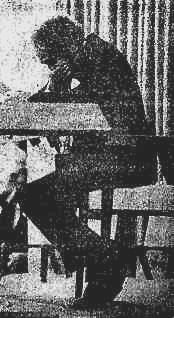 The last known photograph taken of the Emperor while he was under
detention in the Great Guibi (Menelik) Palace, shortly before his death in
1975
The last known photograph taken of the Emperor while he was under
detention in the Great Guibi (Menelik) Palace, shortly before his death in
1975
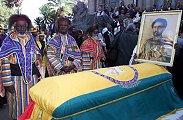 Scene from the Reburial of His Late Majesty Emperor Haile Selassie I,
November 5th, 2000.
CLICK HERE FOR
THE FUNERAL OF H.I.M. HAILE SELASSIE I, EVENTS, PICTURES, AND
ARTICLES
Scene from the Reburial of His Late Majesty Emperor Haile Selassie I,
November 5th, 2000.
CLICK HERE FOR
THE FUNERAL OF H.I.M. HAILE SELASSIE I, EVENTS, PICTURES, AND
ARTICLES
Back to Imperial Ethiopia
Homepage
